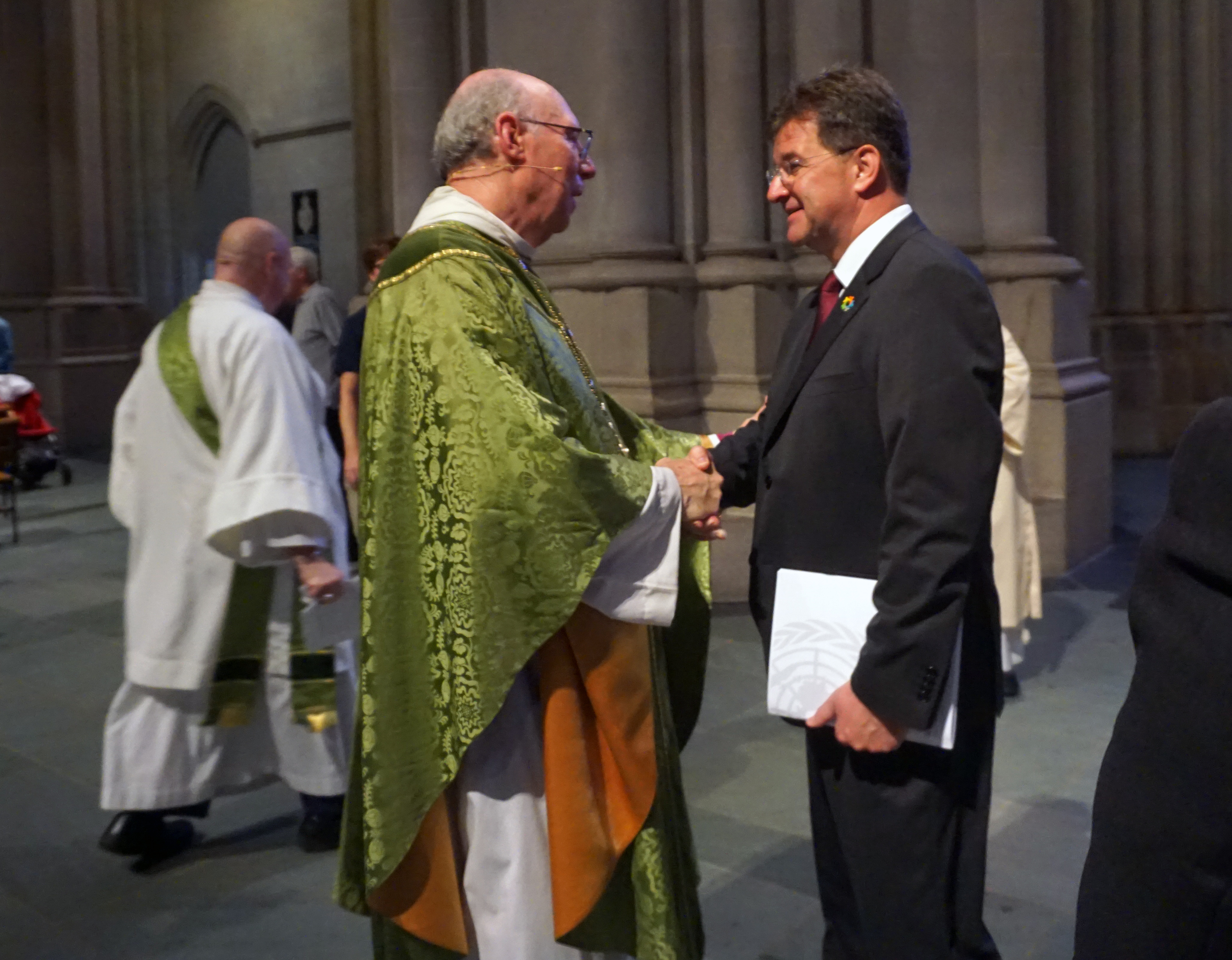UNITED NATIONS SUNDAY – ST. JOHN THE DIVINE

– As delivered –
Statement by H.E. Mr. Miroslav Lajčák, President of the 72nd Session of the UN General Assembly, at the United Nations Sunday at St. John the Divine Cathedral
Good morning to you all – Reverend Dean Daniel, Clergy and Congregants, Excellencies, Ladies and Gentlemen
I was very grateful to be asked to deliver the sermon today.
Thank you, Reverend Dean Daniel, for your invitation. I am certainly not as well-versed as you in this exercise. Nevertheless, I have an important task this morning. And, as the scripture goes, ‘to whom much responsibility is given, much is expected “.
As I was thinking about this morning’s sermon, I was realizing how the work we do, over in the big glass building, and the work going on here, is not that different.
The UN and Faith Communities actually have a lot of things in common. I will speak about four of them in particular this morning.
The UN can learn much from the Church when it comes to strengthening its focus on people. Members of Faith Communities do not usually work from air conditioned meeting rooms or compounds. They are out in communities, talking to people, hearing their concerns, and offering guidance and help.
First, peace is a shared objective.
In the words of its Charter, the UN was created to save succeeding generations from the scourge of war. We have seen the Church work towards this same objective. It has brought warring parties together, to find compromise. It has called for calm and dialogue in situations of high tensions. It has spoken out against threats to peace.
Matthew, Chapter 5, Verse 9 tells us that “Blessed are the peacemakers“. Of course, we are also grateful for blessings on those who work to prevent conflict. Saving peace is easier – and better for everyone – than making it from scratch.
In some areas of the world, faith is being used for evil. It is being turned into a tool to override basic human principles – to convince human beings to act in an inhuman way. We must ensure that we provide avenues for faith to be used for good. To give people the strength to reject violent extremism. To bring communities together to find solutions. To give victims hope.
Second, the UN and Faith Communities are both working to allow people to have a decent life, on a sustainable planet.
The Sustainable Development Goals were adopted by all UN Member States in They provide a plan to end poverty, protect the planet, and improve the lives of people by 2030. They promise not to leave anyone behind. The involvement of Faith Communities is indispensable to the achievement of these goals.
Throughout history, members of the Church have worked for the most poor, vulnerable and marginalized people among us. Faith Communities have provided crucial services, such as healthcare, education and humanitarian aid. Now religious leaders are pressing on the issue of climate change. These actions have helped people’s lives, and worked to protect the planet.
I don’t know if the SDGs are on the minds of rabbis or nuns, who were working to help the people around them. But – wittingly or not – they have been acting as valuable allies of the UN’s work towards Sustainable

Third, both institutions focus on people.
The common thread of humanity runs through us all. It connects us to the victims and survivors of human trafficking, natural disasters, wars and famine across the globe.
The UN can learn much from the Church when it comes to strengthening its focus on people. Members of Faith Communities do not usually work from air conditioned meeting rooms or compounds. They are out in communities, talking to people, hearing their concerns, and offering guidance and help.
We at the UN should be inspired by this in our work.
And we will be in great need of inspiration, given the many challenges facing us as we head into the 72nd Session of the General Assembly. We are confronted with:
complex and interlinked conflicts,
dire humanitarian situations,
the spread of international terrorism and violent extremism,
the existential threat of climate change,
growing inequalities, and
persistent poverty.
People are at the center of these challenges. They are the causes and the victims.
This week, the world’s leaders will meet in New York for the annual General Debate. They will give their ideas on the role for the UN, as it works to support people in striving for peace and a decent life, on a sustainable planet. They will address these global challenges.
During the Debate, and throughout the coming year, we need to do more to focus on people. Because the UN was created for people. Resolutions and agreements are nothing but pieces of paper if they do not have an effect in the lives of people. UN officials and diplomats must expand their perspectives beyond the walls of the UN’s headquarters, and try to best represent the people who you, in this room, meet and help on a daily basis.
A final commonality is that we all need faith to do our jobs.
Sometimes the challenges we face will seem insurmountable. Sometimes we will find it hard to see the achievements among all the problems. Sometimes our goals will seem truly impossible to reach.
We therefore need faith in big reserves! For some, this is faith in God. For others, it is faith in humanity.
Thank you for gathering us here, this morning, to reinforce this faith. I hope it will give us all strength to face the challenges ahead.




